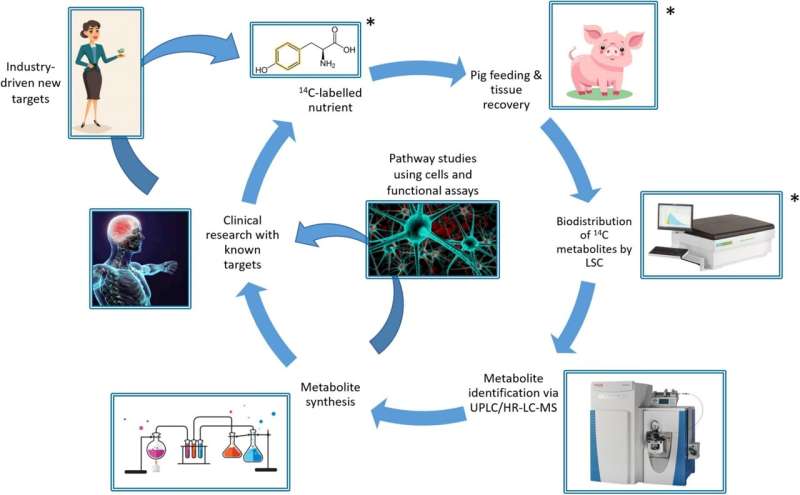This article has been reviewed according to Science X's editorial process and policies. Editors have highlighted the following attributes while ensuring the content's credibility:
fact-checked
peer-reviewed publication
trusted source
proofread
Researchers confirm the link between diet, microbiota and mental health

Fermentation of protein in the gut could release toxins into the body's circulation and affect the brain's access to neurotransmitter compounds, according to an international study by Monash University researchers.
The research, published in Frontiers in Nutrition, adds to the growing volume of work which seeks to understand the relationship between diet, the gut microbiota and mental health.
Tyrosine is an amino acid and precursor to key neurotransmitters, dopamine, adrenaline and noradrenaline, which have profound effects on mood, reward behavior, wakefulness and motor activity.
Dietary tyrosine depletion has been implicated in an increased risk of clinical depression.
When amino acids such as tyrosine are fermented by gut microbes, they may be converted to potentially toxic compounds, such as ammonia, amines, N-nitroso compounds, phenols, cresols, indoles and hydrogen sulfide rendering them unavailable as neurotransmitter precursors and mimicking dietary depletion.
Gut microbes also have the potential to convert amino acids to neurotransmitters (e.g., dopamine, serotonin) that function as signaling molecules in the enteric nervous system, with systemic and brain accessibility, known as the "gut-brain axis."
"The mechanisms that link diet, gut microbiota and mental health are challenging to investigate as this is a complex metabolic pathway," said lead study author Professor Louise Bennett from Monash University's School of Chemistry.
"Demonstrating that bacterial metabolites released in the gut can reach the brain, known as the 'gut-brain axis' is a key step in defining the relationship between nutrition and mental health," she said.
"Our study found that metabolites of gut-fermented protein and specifically amino acid precursors to neurotransmitters such as tyrosine, are potentially able to reach the brain and could influence brain functions including mood."
The research team found that gut microbial metabolism of amino acids from a high dietary intake of resistant protein diet could yield potentially toxic metabolites from fermented protein and disturb the availability of neurotransmitter precursors to the brain.
The researchers used isotope radiolabeling to test the biodistribution of specific nutrients in pigs, chosen for study as their digestive systems were the most closely matched to humans.
"The research has, for the first time, demonstrated a step-wise pathway between dietary intake, gut microbiota and brain," said Professor Bennett.
"We found that a high dietary intake of resistant protein diet alters the pool of amino acids available for normal digestion and metabolism and that digestion of amino acids by microbes in the gut produces unknown compounds that may be able to access the brain."
More information: Margaret Murray et al, Demonstrating a link between diet, gut microbiota and brain: 14C radioactivity identified in the brain following gut microbial fermentation of 14C-radiolabeled tyrosine in a pig model, Frontiers in Nutrition (2023). DOI: 10.3389/fnut.2023.1127729





















